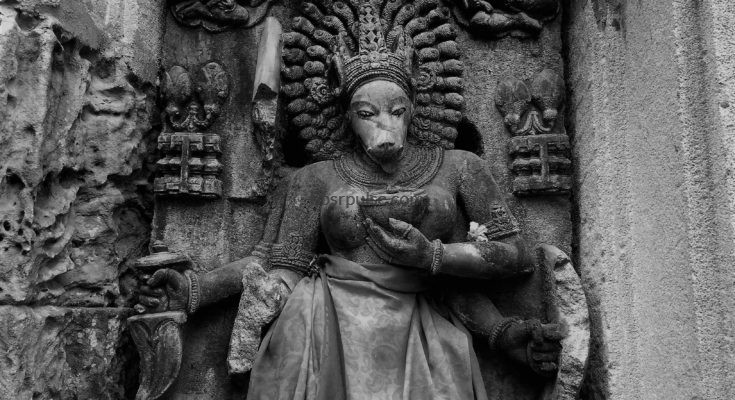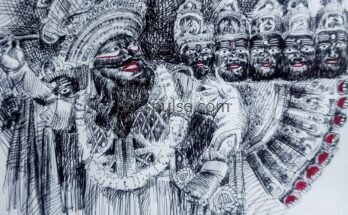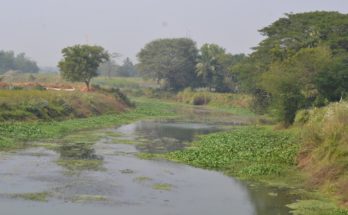Gangeswari temple is a gem of Kalingan architecture, yet very few have visited it, despite being on the road leading to Konark town. Its better portrayed as the prototype of Konarka or mini Konarka by the locals of the Bayalishbati village, both of which were built in the 13th century by Shaivite Ganga dynasty rulers & Gangeswari is their istadevi (Chodaganga & others). Its said that the 1200 craftsmen of Konarks used to stay in this village led by the chief architect Sibei Sa’anta (Sibei Samantaray Mahapatra) who belonged to this village. Both Konarka & Gangeswari are square in plan, both Jagamohana bears similar icons. The Patharabuha naala flowing nearby was used for transporting stones on rafts to Konarka.

Gangeswari temple is located in the Nimapara – Konark route, within 2 kms from Gop chowk, inside a rustic village under the name Bayalishbati in Puri district. The temple although in a dilapidated state, yet its fine sculpture can still be recognised from the detailing. Built in Kalingan architecture, the temple has a khakhra vimana and a pidha jagamohana, but since the temple height is much low (11m), the khakhara style can’t be properly recognised. The temple is made with pancharatha plan with a height of 11m is facing south-west. The interior of the temple is plain blank but the exteriors has some magnificent images including that of nayikas, chamunda, astadikpalaks & others but the one which struck my eyes was the gracious image of four armed Varahi as parswadevi with a bowl (maybe a skull) on one hand, dagger, shield on the rest .

The temple foundation is of laterite stone while the body is made of sandstone which have started showing signs of erosion.
It’s a living temple with four armed Mahisamardini worshiped as principal deity as Gangeswari. The location, carved imagers & other circumstances says that this temple was once a shakti peeth. The popular festivals celebrated at Gangeswari includes Dussehra, Chaitrparba , Shola puja etc .

There’s a big pond (Bayalishbati pokhari) nearby which looks like a flowing river blocked by time. Local people says that this said river was navigable & was used for bring big stones in logs for making the temple. Good news is that there’s one signage by Deptt of Culture on the Gop road for new visitors to track down the temple.
Since, the roads are quite narrow from Gop, its better to take smaller vehicles to the site & carry your own prasad items. The nearest new place of interest is Kuruma Buddhist monastery site & one can view the sacred Prachi river flowing nearby while driving towards Kuruma.
How to reach : Bhubaneswar>Puri route>Nimapara>Gop chowk>Bayalishbati village>Gangeswari.
Images: Taranisen Pattnaik
Ref: http://ignca.nic.in/asi_reports/orpuri022.pdf, ‘Gangeswari Temple – an unexplored ancient temple in Odisha’ blog by Ashish Sarangi




Do you know of any other ancient varahi temples in this region besides chaurasi and this one?
Thanks for browsing my blog & posting valuable comment. Regarding Varahi temples in Odisha beyond Chaurasi & Gangeswari, there’s one at Bali Sahi, Puri Town. There are also Varahi statues as parsdwadevis in other temples associated with shaktism like 64 Yogini temple-Hirapur (near BBSR), Madhava temple (Niali). Likewise Varaha temples or images in Odisha includes Varahnath temple-Jajpur, Laxmi Varaha Temple-Kendrapara & 64 yogini temple at Ranipur-Jharial (Bolangir)
Found your article very interesting. Had heard about this temple a long time ago but never had the opportunity to have a look at it. May be our group, Ashish, Shivaji, Bikash,Dipak and others will plan out a trip there.
Sure Sir, we can plan a trip to this part of Puri and visit the beautiful heritage sites of Gangeswari, Kuruma, Madhukesvara & Bodhakesvara soon with Ashish Sarangi bhai